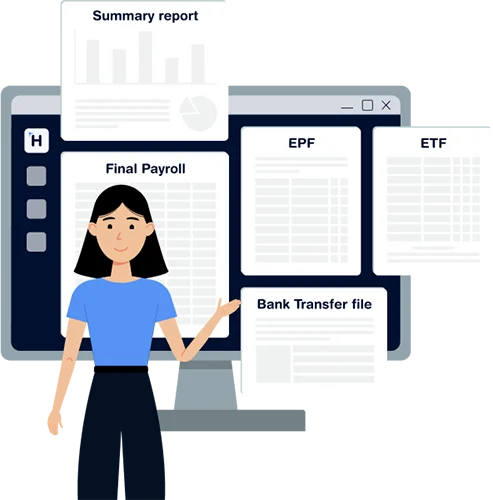“Are you still interested in pegged salaries?”
In early 2022, companies in Sri Lanka made a significant shift to pegged salaries to address the fluctuating exchange rates. However, the situation has evolved since then, and the effectiveness of pegged salaries is now being reconsidered. The value of the US dollar has experienced fluctuations, with recent increases following a period of decline. Unfortunately, the Sri Lankan economy has not yet achieved the stability required to sustain a long-term appreciation in LKR.
As a consequence, when the dollar depreciates, employees may face deductions from their salaries, as the additional amount is added during periods of dollar appreciation. In simpler terms, when the dollar loses value, employees might see a decrease in their salary compared to what they received during times when the dollar was stronger. Consequently, employees are also reevaluating the benefits of pegged salaries, despite their advantages when exchange rates are on the rise. This dynamic situation necessitates careful consideration and further analysis to determine the most suitable compensation approach for both employers and employees.
To help you better understand the concept, we will explain USD-pegged salaries using a practical example in this article.
Example:
Introducing Nugara, a talented software engineer from Sri Lanka who has been offered a position with a leading global tech firm. The company operates in multiple countries, and to assure fair compensation, they use USD-pegged salary. Nugara’s agreed basic salary is 1000 USD, the company’s base exchange rate is 200 LKR, and the current exchange rate is 250 LKR.
1. How to establish the peg?
Setting a benchmark exchange rate between the local currency and the dollar serves as the basis for USD-pegged pay. The conversion rate is used as the starting point for figuring out an employee’s salary in US dollars. It is usually negotiated between the employer and the employee and might be based on going market rates or adjusted to consider the cost of living and purchasing power in the employee’s geographical region.
A benchmark exchange rate between the Sri Lankan Rupee (LKR) and the US Dollar (USD) is established by Nugara’s employer. Assume we have a pegged exchange rate of $1 = 200 LKR. This exchange rate will be used as a benchmark for converting Nugara’s salary into US dollars.
2. How to calculate the pegged salary?
Employees are paid in local currency once the peg has been established. Some organizations only peg the basic salary, while others peg the complete income including fixed and variable allowances. That depends on the company. Therefore, the pegged amount can be added as a variable allowance. But when the dollar depreciates that amount can be deducted as an inflation adjustment from the net salary as it was added when the dollar appreciates.
Here’s another formula to calculate the pegged amount,
Current exchange rate – base exchange rate * basic salary
To gain a clear picture, let’s now calculate Nugara’s pegged salary.
Only the basic salary, which is $1000 per month in USD, is pegged by Nugara’s company. His employer determines his LKR salary using the pegged exchange rate. In this case, Nugara would receive a monthly salary of 200,000 LKR (200 LKR * $1,000).
| Item | LKR |
|---|---|
| Pegged salary 1000*250 | 250,000 |
| Original salary 1000*200 | 200,000 |
| Pegged amount | 50,000 |
| Gross earnings (200,00+50,000) | 250,000 |
Nugara’s pay slip

3. What if the exchange rate changes significantly?
To ensure that employees’ salary is fair and consistent, employers conduct periodic reviews. These reviews, which are done annually or semi-annually, take factors like changes in the exchange rate and the cost of living into account. To maintain reasonably consistent purchasing power in US dollars over time, compensation for employees would be adjusted if the exchange rate changed significantly during a review.
4. Can employees convert LKR salary into USD?
In Sri Lanka, it is generally not allowed to pay employees in a foreign currency, except under specific circumstances outlined by the law.
Even though Nugara gets paid in LKR, he has the freedom to convert his money if necessary. The conversion can be carried out utilizing the current exchange rates at the time of conversion through banks or currency exchange services. It’s important to remember that fees and fluctuating exchange rates are possible during the converting procedure.
5. How important is clear communication?
Employers and employees must communicate openly for USD-pegged salaries to be implemented successfully. The frequency of adjustments, the pegged currency rate, and any potential effects on salaries should all be disclosed to employees. Building trust through transparent communication also makes sure that everyone is on the same page regarding how the compensation arrangements will be implemented.
Conclusion
In conclusion, the implementation of USD-pegged salaries has been a significant shift for companies in Sri Lanka to address the fluctuating exchange rates. While pegged salaries offer advantages during periods of dollar appreciation, the dynamic nature of exchange rates has led to some drawbacks. As the value of the US dollar fluctuates, employees may experience deductions or increases in their salaries. The effectiveness of pegged salaries is now being reconsidered, prompting further analysis and careful consideration of the most suitable compensation approach for both employers and employees. Clear communication between employers and employees, periodic reviews, and the option for employees to convert their LKR salaries into USD are all crucial factors in successfully implementing USD-pegged salaries. Ultimately, finding a balance between stability, fair compensation, and transparent communication is key to ensuring a sustainable and equitable salary structure in the face of evolving exchange rates.

